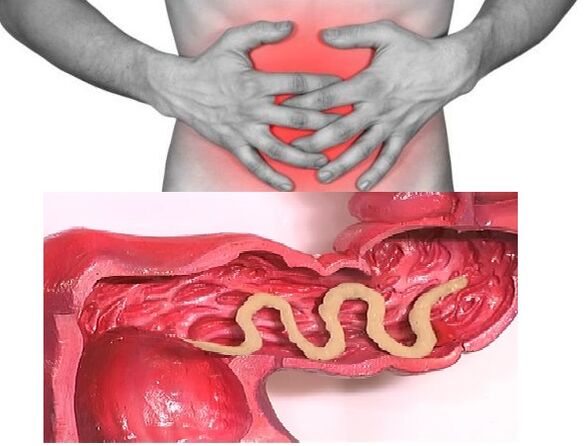Many do not even think about the presence of parasites in their body. Moreover, people often do not even suspect that if they have any health problems, the culprits of this condition are microorganisms that exist at the expense of the owner.
During this time, the worms cause various helminthiasis (ascariasis, enterobiasis, echinococcosis, trichinosis, etc. ). In the absence of deworming, a person develops a number of various complications.
So, if helminthic invasion in childhood is not treated, a delay in mental and physical development may occur. And the organs affected by worms contribute to the appearance of inflammation, which does not go away even after the parasites are removed.
But how to determine the presence of parasites in the body at home? What symptoms and diseases accompany the different types of helminthiasis?
What should you look for to identify worms in humans

Rough skin, the appearance of spots, acne, baldness and premature wrinkles - all of these manifestations can indicate the presence of parasitic microorganisms. Additionally, nail problems or the formation of cracks in the heels (damage to digestive organs) may indicate helminthiasis, sometimes there may be a link between psoriasis and lamblia.
Often the above symptoms are caused by lamblia or Trichomonas. However, any helminthic invasion negatively affects immunity.
This, in turn, leads to the appearance of such signs:
- sinusitis;
- angina;
- polyps;
- inflammation of the paranasal sinuses;
- sudden onset of snoring.
To recognize parasites in humans, one should pay attention to the presence of adenoma, cystitis, impotence, prostatitis, stones and sand in the kidneys and bladder. Some worms affect the brain and affect the development of future offspring.
To find out which parasites women have, the following symptoms will help:
- myoma;
- painful sensations during menstruation;
- fibroma;
- disturbances of the menstrual cycle;
- disturbances in the functioning of the bladder and kidneys;
- fibrocystic breast disease;
- inflammation of the ovaries.
With appendicitis, one should think about the presence of pinworms, biliary dyskinesia or pancreatitis indicating opisthorchiasis.
Hookworm larvae that enter the lungs often cause false pneumonia. In addition, the manifestations of some types of helminthiasis are similar to angina or bronchitis.
In addition, the symptoms of parasites in the human body are:
- insomnia, constant malaise and anemia;
- weakened immunity;
- avitaminosis;
- discomfort in the gastrointestinal tract, constipation, dysbiosis;
- weight changes;
- allergic reactions;
- irritability and anxiety;
- skin problems.
Symptoms of the presence of parasites in the body

To understand whether I or you have helminths, you need to pay attention to a number of quite diverse signs. Typically, large worms contribute to constipation because they block the bile and intestinal ducts, which interferes with natural bowel movements.
A certain type of parasite secretes special substances that thin the stool. Therefore, diarrhea is not always a symptom of a gastrointestinal disorder, it often indicates the presence of parasitic microorganisms in the human body.
In addition, the parasitic microorganism causes bloating and gas formation. This happens when helminths enter the small intestine, causing an inflammatory process there.
Another sign of helminthic infestation is irritable bowel syndrome. Thus, the worms contribute to poor absorption of fat, which causes them to enter the large intestine. Therefore, their increased amount in the stool is observed. This leads to cramps, diarrhea, and constipation.
Certain types of worms can exist in muscle and joint fluid. Therefore, their presence in these areas causes painful sensations similar to the symptoms of arthritis. In reality, this discomfort is due to inflammation, which is the immune response to the presence of worms.
Allergic manifestations are a feature of many types of helminthiasis. After all, the toxins secreted by the worms elicit an immune response, which should produce many eosinophils. But an overabundance of protective cells contributes to the development of inflammation, which results in allergies.
Often times, the worms cause rashes, eczema, acne, and other disorders. So, the simplest parasites lead to the formation of ulcers, papillomas and dermatitis.
Helminthic invasion is almost always accompanied by anemia. This is due to the fact that after entering the intestine, the worms attach themselves to its mucous membrane and suck nutrients from the host's body. In particular, Trichomonas, which feeds on blood cells, causes discomfort, as a result of which significant blood loss occurs.
People with helminthiasis often have weight problems. So, excess body weight indicates that worms are poisoning the human body with toxins or consuming glucose. And excessive thinness indicates disturbances in metabolic processes.

Due to the deterioration in well-being caused by the helminthic invasion, the patient becomes overly irritable and emotionally unstable. After all, the wastes from the worms poison their host, adversely affecting the nervous system, as a result of which the patient is in a depressed state.
Insomnia is a characteristic sign that parasites are active in the body. Therefore, if a person often wakes up at 2-3 o'clock in the morning, then he should contact a parasitologist, because it is at this time that the liver tries to remove all toxins. In addition, roundworms or pinworms come out through the anus at night, causing itching and irritation.
In patients under the age of 15, worms often cause teeth grinding during sleep. Thus, the nervous system reacts to the toxins secreted by the worms.
In addition, almost all helminthiasis is accompanied by chronic fatigue syndrome, characterized by memory impairment, listlessness, and the presence of flu-like symptoms. This signals a deficiency of nutrients consumed by pathogenic microorganisms.
With prolonged helminthic invasion, immune disorders occur in the patient's body. After all, the vital activity of worms significantly depletes the body's defenses, which leads to the development of allergic manifestations and the creation of favorable conditions for the penetration of infection.
Even prolonged parasitism of harmful microorganisms causes damage to organs and tissues, against this background oncological diseases develop. In this case, inflammatory foci are formed, and the body suffers from a deficiency of nutrients.
All of this is supplemented by malfunctions in the functioning of the immune system. Thus, favorable conditions are formed for the appearance of various oncological diseases.
Certain types of worms are localized in the human respiratory system, causing inflammation of its organs. As a result, the following symptoms appear:
- runny nose;
- temperature increase;
- cough;
- pneumonia;
- asthma.
How to detect helminthiasis using medical research?

In the presence of the above symptoms, in order to find out whether or not there are parasites in the body, you need to consult a doctor. You may need to see a parasitologist, infectious disease specialist, gastroenterologist, surgeon, sometimes an ENT doctor or ophthalmologist, as it all depends on the location of the worms.
Often times, the diagnosis involves scratching and examining the stool for the presence of eggs. However, such analyzes make it possible to check whether there are living worms in the intestinal tract or parasites that migrate along it (tapeworms and tapeworms, fluke).
Due to the fact that the eggs do not always come out of the anus, the study should be carried out 2-3 times. Using these diagnostic methods, the following are detected:
- paw;
- whipworms;
- tapeworms;
- pinworms;
- schistosomes;
- roundworms;
- trichinella;
- hookworms.
Many types of helminths (leishmania, lamblia, trypanosomes, echinococci, plasmodia, amoeba, toxoplasma) can be localized in almost all tissues and organs, which makes the analysis of feces uninformative. In such a situation, the patient should perform a blood test for the presence of immunoenzymes, which indicates the presence of antibodies and antigens.
To determine the parasite living in the host's liver, probing and examination of the collected material is performed. If the helminth waste is found in the human liver, this indicates an infection.

















